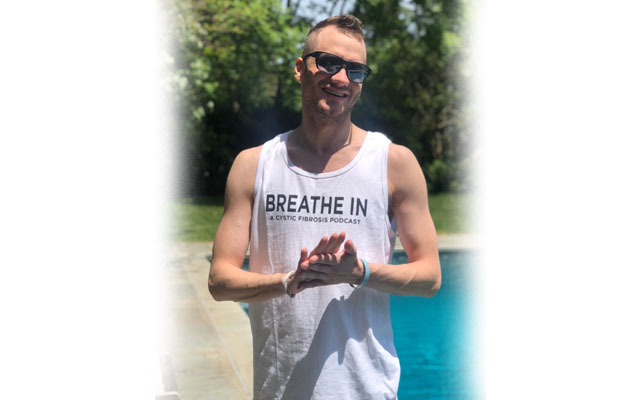Disease disclosure is exactly what it sounds like – telling someone about your illness. We’ve spoken briefly about disease disclosure on here before, but I want to dive into it a little bit.
One of the live-streamed sessions at NACFC called disease disclosure a “skill.” Mind you this was coming from someone on the care provider side, so it’s really feels like an objective third party look at the term. I happen to agree. I think disease disclosure is absolutely a skill, and beyond that, it’s a skill that people MUST sharpen. The ability to talk fluidly about cystic fibrosis is an essential for self-preservation. It’s the root of advocacy.
The presentation at NACFC made the connection between disease disclosure and overall health, too. It was stated that people who are able to talk about their cystic fibrosis generally have better health. Why is that? I have to imagine there are dozens of reasons to back that up, but it probably revolves mostly around acceptance of the condition and self-preservation.
For kids, though, it can be a bit of a challenge. They are reliant on their parents to know what cystic fibrosis is and how to talk about it. Parents must be able to show their kids the importance of this essential skill, because when the kids grow up, they need to have the foundation of disease disclosure present. It’s a hard skill to pick up later in life.
Some real world examples of disease disclosure revolve around the not so invisible side of cystic fibrosis – coughing, farting and general illness.
I consider these to be among the more recurrent spontaneous catalysts of disease disclosure, situations where people with CF are put on the spot to talk about their condition.
Like most elementary school students, I was self conscious of passing gas in class. In first grade, I was too young to understand why I was farting more than the rest of my friends, but to make a long story short, one day I expressed my concern to my mom. My mom told me that she would take me to talk to my first grade teacher one day before class. I stood next to my mom as she carefully articulated my concern to the teacher. The teacher in turn reassured me that I wouldn’t be considered the smelly kid in class.
There’s a little bit more to the story (which you can hear on Episode 50 of Breathe In Podcast), but for the interest of a quick blog, it was one of my first experiences of being included in advocating for my needs. Prior to that point, my parents had worked behind the scenes with teachers, coaches or whomever else to give me the best possible chance to succeed with CF.
Coughing in public is probably the best example of a situation leading to spontaneous disease disclosure. A year out of college, I picked up part time work as a youth hockey coach. I was coaching middle school hockey, so basically 6-8th grade kids. One of the first days at practice I was coughing and then spit out my mucus onto the ice, just like I normally do when I play. The head coach of the team thought it was one of the kids, and was so disgusted that she stopped practice. She told the kids never to spit on the ice, leaving me feeling totally totally dumbfounded. After practice I pulled her aside, told her what had led to the mysterious green glob on the ice, and asked for an apology. I think she felt fairly embarrassed and was quick to apologize. I was able to explain why I spit on the ice, rather than in bench area because I’ve been pestered about it for my entire hockey career. This specific moment just happened to be in a professional setting. From then on, she and I never had a problem with it.
General illness – chest pain, coughing up blood, fevers, etc. – seems to be the most difficult of the spontaneous disease disclosure catalysts. It’s hard to talk about coughing up blood without terrifying someone. Success in emergency situations or more serious situations is dependent on everyone’s ability to stay calm, and also the ability to effectively communicate specific needs.
I think back to my college days when I was in the early stages of a battle with pneumonia. I was watching TV with a roommate when I suddenly found myself in a hard coughing attack, before getting violently sick. I’ll remember this moment for the rest of my life because of the way people in the suite responded – aside from my roommate and I, who were watching TV, two of my other roommates were in the suite as well as a “guest,” who knew I had CF, but didn’t know too much about it.
As I tried to make it to the bathroom, I came up just a few feet short, and for lack of a better term, puked my brains out. The floor was a mess and I was covered in it. After an awkward moment or two, my roommates sprang into action to help, while our guest quite literally ran away and wanted nothing to do with what had just happened to me. It was both embarrassing and humbling to see how the guest reacted, but my roommates snapped me back into the moment to actively care for the situation. It ended up being the start of a long three weeks, but my violent illness basically denied the possibility of disease disclosure, when the guest ran for cover, and resulted in a humiliating experience. Was there anything I could have done differently in the emergency situation? I’m not sure.
I want to know what you think about disease disclosure. Is it a skill? It is something you try to take control of ahead of these spontaneous catalysts or do you wait until something like the above happens to disclose?
…and that’s what I’m thinking about this morning.
Image: Courtesy Tiffany Rich





